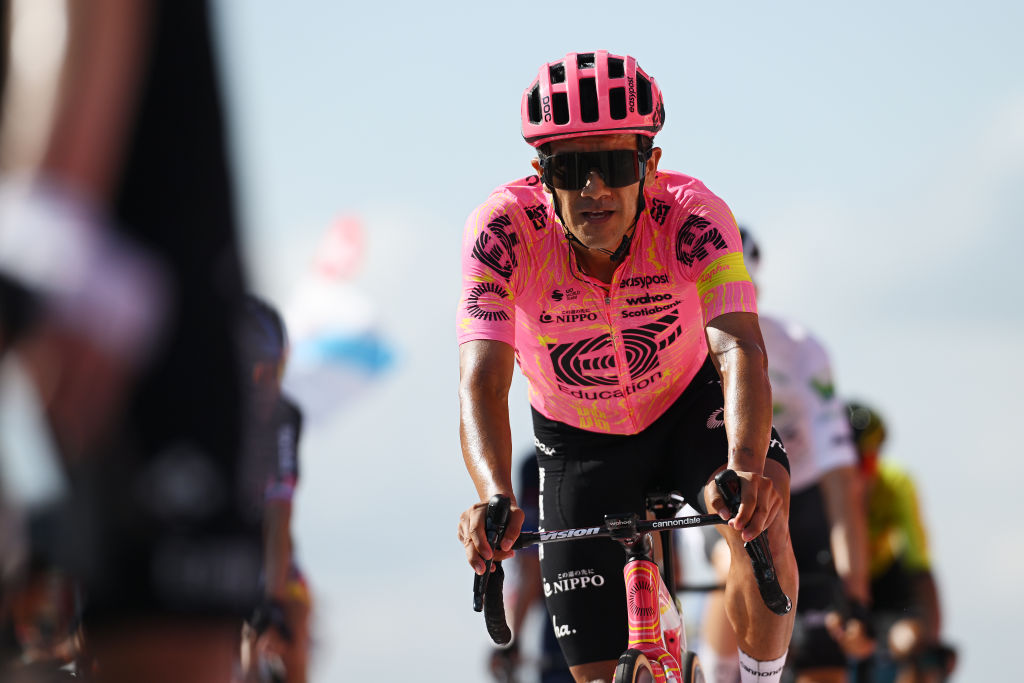'A lack of respect' – Richard Carapaz dismayed by Decathlon AG2R's reaction to Vuelta a España crash
Ecuadorian crashed on stage 11 after Ben O'Connor's squad blocked road for breakaway

Even behind sunglasses and a face mask, Richard Carapaz's dismay was self-evident when he arrived in the mixed zone in Ourense ahead of stage 12 of the Vuelta a España. The day would end with a summit finish at Manzaneda, but that looming appointment was overshadowed entirely by unfinished business from the previous afternoon.
Carapaz's attempted attack with 90km left in stage 11 had been blocked by members of Ben O'Connor's Decathlon AG2R La Mondiale squad, and the Ecuadorian crashed after clashing with Geoffroy Bouchard. The commissaires doled out yellow cards and fines to four members of Decathlon at the end of the stage, but Carapaz's EF Education-EasyPost squad was of the view that the punishment was hardly a fitting one.
In Ourense on Thursday, Carapaz was unequivocal when asked if he felt his crash had been caused by Decathlon's blocking manoeuvre, believing the television pictures to be evidence enough of what had transpired.
"Yes. In the end, it was very clear," Carapaz said. "There are many ways of defending a jersey but the way they're doing it is very sad to me because it's a lack of respect. I can't judge it, everybody does what they do."
The commissaires had paid a visit to the EF Education-EasyPost bus before the start to hear their account of Carapaz's crash the previous afternoon, and they also held a parley with members of the Decathlon staff. There was, however, no clearing of the air between Carapaz and Decathlon ahead of the stage.
"There's been nothing, and that's the worst thing, you know," Carapaz said. "We're waiting for that to happen. If you make a mistake, you should at least speak about it and say that you're sorry, it wasn't intentional. There is a lot of arrogance, I haven't heard anything else from them."
Carapaz remounted swiftly after the crash and rejoined the fray, but he would struggle later in the stage, conceding 15 seconds to danger men Primož Roglič and Enric Mas when they attacked on the final climb of Puerto Cruxeiras. It meant that Carapaz dropped a place to fourth overall in the Vuelta a España GC standings, though he picked up a handful of seconds on the red jersey O'Connor to leave himself 4:10 down in the standings.
Get The Leadout Newsletter
The latest race content, interviews, features, reviews and expert buying guides, direct to your inbox!
Despite that late setback, Carapaz reported no lasting injury from the incident. "Physically, there's nothing," he said, though he did little to mask his frustration at how events had unfolded during and after stage 11. "Respect is being lost in the peloton and things like that can't go on."
Once the stage got underway, there would be an afternoon of relative détente among the overall contenders. The category 1 haul to the finish at Estacion de Montaña de Manzaneda failed to create any separation in the red jersey group, where Carapaz rolled home alongside O'Connor, 6:29 behind the day's winner Pablo Castrillo.
George Bennett
At the start in Ourense, Carapaz wasn't the only rider to query Decathlon-AG2R's approach to blocking the road in a bid to dissuade would-be attackers. George Bennett (Israel Premier Tech) ultimately made it aboard the break on Wednesday, but only after a tussle of his own with the phalanx of Decathlon riders at the head of the peloton.
"It's sometimes a contact sport. They tried to block me, and I tried to go, so I was either going to get through or one of us was going down," said Bennett, who felt he had been rightly punished when he was on the other side of a similar incident during his time at Jumbo-Visma.
"It's something I did once to Chad Haga in the Tour de France when we had the jersey. I went to block him, and he went on the gravel and afterwards, I got a fine. That was a really shit thing to do and I don't want to do it again."
The practice of teams blocking the road to prevent breakaways has appeared to become more prevalent in recent seasons, though that perception may simply be a consequence of stage-long television broadcasts. Bennett stressed, however, that there was a world of difference between a team massing at the front to slow the peloton and individual riders deviating from their line to stymy an attack.
"It's really important to differentiate between the guys who are just riding on the front with the team and the guys who turned right and left to block me and to put Carapaz in the ditch," Bennett said.
Decathlon-AG2R, for their part, have denied all wrongdoing. "I completely stand by the boys," O'Connor said in Ourense before stage 12. "I can say we did absolutely nothing different or wrong. We showed no aggression to anybody else."

Barry Ryan was Head of Features at Cyclingnews. He has covered professional cycling since 2010, reporting from the Tour de France, Giro d’Italia and events from Argentina to Japan. His writing has appeared in The Independent, Procycling and Cycling Plus. He is the author of The Ascent: Sean Kelly, Stephen Roche and the Rise of Irish Cycling’s Golden Generation, published by Gill Books.